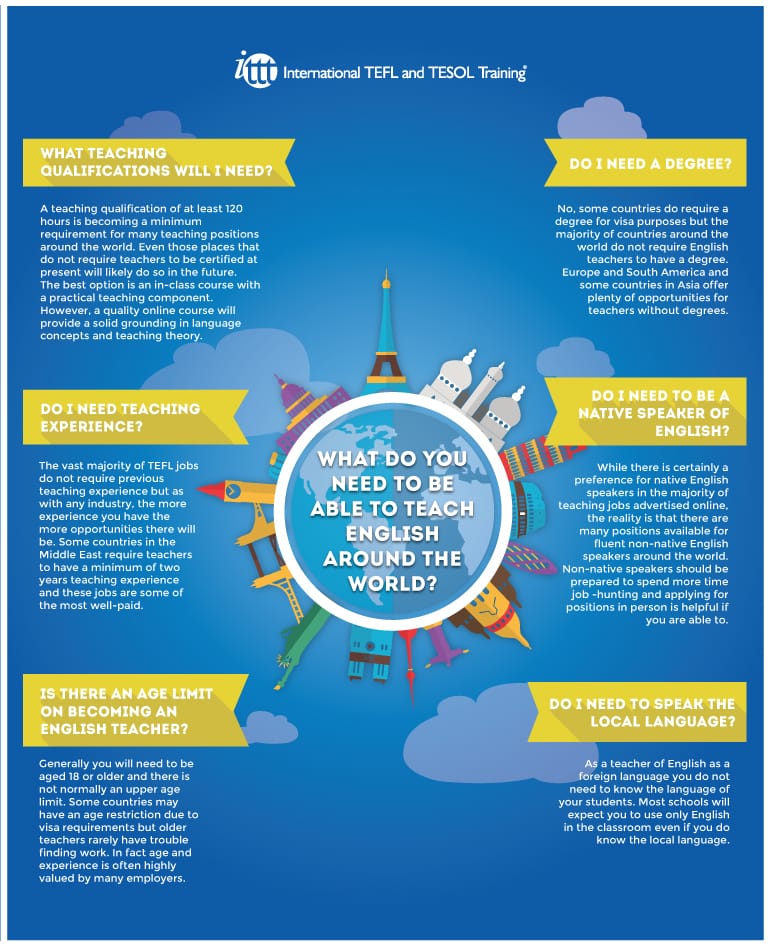ESL certification requirements for teachers
To begin a journey in teaching English overseas, what is primarily needed is an eagerness to delve into unfamiliar terrains and a valid teaching certification. The TESOL certificate stands out as the universally acknowledged qualification in this field. These courses often have few entry requirements, ensuring they are open to a broad spectrum of people from all different backgrounds.
What level of English is required to take a TESOL course?
A foundational prerequisite for enrolling in a TESOL certification course is a proficient command of the English language. This standard holds true for both native and non-native English speakers. If you demonstrate a thorough comprehension of English in its written and spoken forms, you are well-positioned. The global demand for English language teachers is considerable, often exceeding the supply of certified teachers in many areas. Given this strong demand, a plethora of opportunities beckon prospective teachers. Most countries are open to applications from non-native English speakers. Notably, at ITTT, we have observed that non-native speakers frequently make up a large portion of our TESOL course participants, even surpassing native speakers in numbers.
What age limits are there with TESOL courses?
The worldwide demand for TESOL-certified instructors ensures there are plenty of job opportunities across different age brackets. To enroll in an ITTT TESOL certification course, the minimum age requirement is 18, and there is no maximum age. Globally, teachers of varying age groups can be found enriching classrooms. From fresh graduates on a gap year to retirees looking to embark on a new journey, the age spectrum of teachers is vast and diverse across the spectrum of English language education. Indeed, for those armed with a TESOL qualification, the opportunities are limitless, regardless of one's age.
What educational background do I need to take a TESOL course?
At ITTT, our primary focus is on your ability to teach and grasp the English language effectively rather than your academic qualifications. While we do not set stringent academic prerequisites for enrollment, we emphasize the importance of having a solid proficiency in English and a genuine desire to acquire teaching skills. It is worth noting that while certain countries like China, Japan, and South Korea expect a degree for work permit purposes, many other destinations are more flexible in their requirements. Given this varied landscape, we have opted to keep our TESOL course entry criteria inclusive and accessible to all passionate future teachers.
Do English language teachers need to be bilingual?
No, ESL teachers are not required to speak any language other than English. Our TESOL certification courses at ITTT champion the immersion method of language teaching. This means that during an ESL class, only English is spoken, irrespective of the teacher's or students' native languages. This approach mirrors the natural language immersion one would experience if living in an English-speaking environment. It not only enhances rapid language acquisition but also boosts the students' confidence in using English as their primary means of communication in the classroom.
Do qualified teachers still need to complete a TESOL course?
Many educators with standard teaching certifications choose to pivot their careers towards teaching English as a foreign language, whether within their home country or overseas. While it might seem that their existing teaching qualifications should suffice, this isn't always true. Teaching English has its own set of unique challenges and techniques which might not be covered in traditional teacher training programs. Although having a traditional teaching background can provide an edge during the hiring process, most employers expect a TESOL certification on top. This assures them that the candidate is equipped with the specialized knowledge and skills crucial for this distinct educational environment.
Do I need to know a lot about grammar to teach English abroad?
Teaching English to non-native speakers requires a deep understanding of English grammar. That said, you don't need to be an expert before enrolling in a TESOL course, as grammar instruction is a core component of the training. While having prior knowledge can be beneficial, many trainees start their courses with just a basic understanding of English grammar. This understanding is then further enhanced throughout the training. By the end of your course, you will be equipped with the knowledge to teach basic grammar confidently. However, it is worth noting that a truly comprehensive grasp often comes to many teachers after they have spent considerable time teaching regular classes.
Register now & get certified to teach english abroad!








